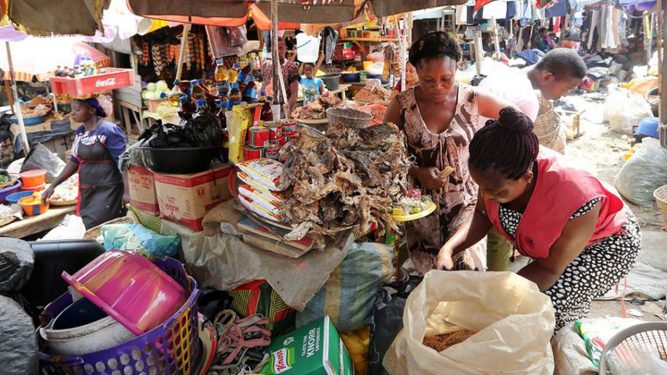ECONOMY
Inflation: Economist urges FG on policies to stabilise prices of essential items

A developmental economist, Dr Benjamin Omoniyi has urged government to introduce policies that will stabilise the prices of essential items as a macroeconomic objective of the nation to address inflationary pressures.
Omoniyi, a lecturer, Economics Department, Joseph Ayo Babalola University, Arakeji, Osun, made the call in an interview with our reporter on Monday.
It was reported that September inflation index by the National Bureau of Statistics (NBS), which stood at 13.71 per cent was a 0.49 per cent increase from 13.22 per cent in August.
Food inflation stood at 16.66 per cent in September from 16.00 per cent in August and core inflation was at 10.58 per cent in September from 10.52 per cent in August.
Omoniyi urged government on strengthening the Naira, maintaining price index and engaging policies to reduce inflation rate to single digit.
He said the inflation figure, which was in double digit would have negative impact on citizens, who for some months were without income due to the effects COVID-19 pandemic.
He said this resulted in a reduction in purchasing power and declining welfare for citizens.
“In the case of purchasing power improvement, it is evident that the lockdown caused by COVID-19 pandemic has adversely affected the welfare of everyone in Nigeria, especially the greatest proportion of the population who are the poor.
“This arises via high prices of both serial and finished products thereby reducing the purchasing power of the Nigerian naira, which subsequently led to increase cost of living thereby creating hardship on the people.
“To ameliorate this problem, the government should increase government purchases and reduce taxes impositions so that improved level of disposable income is guaranteed in the post-COVID-19 period,” he said.
Omoniyi said that the increase in the rate of inflation could affect the prices of manufactured products negatively, thereby reducing the demand for them.
He said this would further disturb Nigeria’s industrialisation process by making manufactured products more expensive such that the citizens would prefer to patronise foreign products against locally produced ones.
“This would enable local manufacturing firms because high prices will prevent them from competing with foreign firms.
“It is also worthy to note that high domestic price may simply turn Nigerians products to became unacceptable abroad.
“This may eventually lower foreign exchange earning capacity of Nigeria,” he said.
The economist stressed the need to seek ways to increase the purchasing power of citizens by the creation of policies that would engender increased disposable income.
Omoniyi recommended that this could be achieved through tax cut with its attendant multiplier effects on consumer’s finances.
He urged government to engage measures that would lead to a decrease in the cost of communication and transportation via improved rail system.
“This may lead transport people to lower their cost and move into the interior part of Nigeria to move agricultural products from production areas to where they are needed.
“This will improve farm income thereby enhancing purchasing capacities of rural areas.
“Furthermore, government may also introduce policies of improved rural infrastructure to improve living conditions of the people.
“Additionally, government may increase her expenditure through government purchases to enable the public have access to public goods and improved businesses,” he said.


























 Davido's Net Worth & Lifestyle
Davido's Net Worth & Lifestyle 
